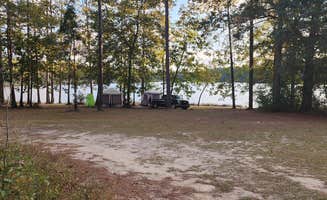Primitive camping near Enterprise, Alabama extends beyond the well-known Geneva State Lake area. The region features several dispersed camping options within an hour's drive, most situated in the longleaf pine forests typical of the southeastern coastal plain. Summer temperatures often exceed 90°F with high humidity, while winter nights can drop below freezing, affecting campsite selection and preparation.
What to do
Fishing opportunities: Geneva State Lake provides access to two fishing docks where anglers can catch bass, bream, and catfish. One camper noted, "Beautiful park to camp next to the lake with 2 fishing docks," highlighting the convenient water access for fishing enthusiasts.
Hiking forest trails: The surrounding woodlands offer hiking opportunities with varying difficulty levels. At Geneva State Lake, a visitor mentioned, "There are 2 hiking trails - more like atv trails that go to either side of the lake from the campground. You can go further into the forest but it was deer hunting season so I didn't explore."
Wildlife observation: The quieter camping areas attract diverse wildlife. Campers frequently report seeing deer, wild turkeys, and various bird species, especially during early morning hours when animals are most active.
What campers like
Budget-friendly options: Geneva State Lake camping remains affordable compared to developed campgrounds. A recent visitor confirmed, "The camping price is $2 per night, no reservation is needed, and is online payment," making it accessible for spontaneous trips.
Lakeside sunrises: The eastern exposure at Geneva State Lake creates memorable morning views. One camper described their experience: "It was so peaceful and the sunrises over the lake were breathtaking."
Well-maintained facilities: Despite being primitive, many sites receive regular maintenance. A camper appreciated that "It's a well maintained park and you can tell a lot of love has gone into it. Even had a ranger come through!" This indicates ongoing care despite the remote setting.
What you should know
Road conditions: Access requires navigating unpaved roads that may become problematic in wet weather. One camper at Geneva State Lake shared their concern: "I didn't want to get stuck there in the rain - it was about 5 miles of dirt roads to get in there and they were well maintained but I didn't want to risk it."
Payment systems: Most primitive sites now use digital payment methods rather than cash boxes. Prepare before arrival as one camper noted about Geneva State Lake: "There is a QR code on the board to pay, or you can buy an annual pass for $40 if you plan on staying at least 9 days it's worth it."
Hunting seasons: Be aware of hunting activity in surrounding forests, especially during fall and winter. A camper mentioned limiting their exploration because "it was deer hunting season so I didn't explore." Wearing bright colors during hunting seasons is recommended.
Tips for camping with families
Terrain considerations: Caryville Public Boat Ramp and other primitive sites typically lack level ground. Families should bring equipment to stabilize tents and cooking gear on uneven terrain.
Bathroom preparation: Most primitive sites offer only basic sanitation. At Geneva State Lake, campers report "No bathrooms just port a potty." Families should pack portable toilet supplies, especially for younger children.
Wildlife precautions: Store food securely and teach children proper wildlife safety. The southeastern Alabama forests contain small mammals and occasionally snakes that may be attracted to camp food or garbage.
Tips from RVers
Site leveling challenges: Most primitive areas lack prepared pads for larger vehicles. One RVer at Geneva State Lake observed that "these sites were not level," suggesting that leveling blocks are essential equipment.
Access for different vehicle sizes: Smaller RVs and vans navigate the access roads more easily than larger rigs. A camper with a 20-foot van reported successful navigation but cautioned about weather-related road conditions.
Water and waste management: No hookups exist at primitive sites, requiring complete self-sufficiency. RVers should arrive with full freshwater tanks and empty waste tanks, prepared for at least 2-3 days without services.


